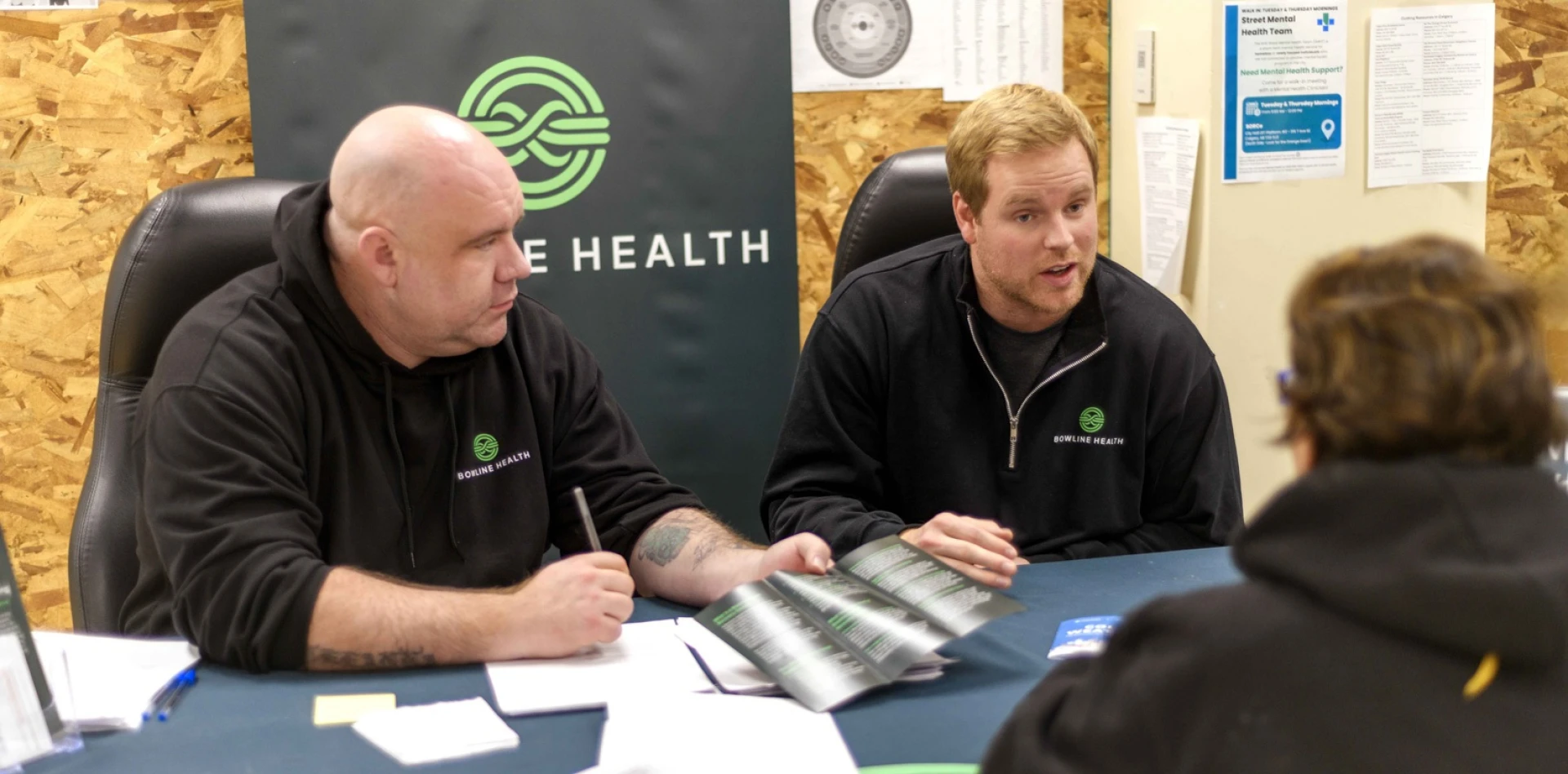
We provide in-person and virtual care programs to ensure that participants receive appropriate recovery support without unnecessary delays. Each program is carefully crafted to provide the necessary support, education, and resources to help individuals achieve sustainable recovery and a fulfilling life.
We currently offer the below services through our virtual, in-person, and recovery coach training programs.
This program provides personalized, one-on-one support from a dedicated recovery coach without requiring admission to any other care setting. In-person services include:
Our Virtual Recovery Coaching program provides prompt assistance to give participants access to care—wherever, whenever. Virtual services include:
Through our partnership with the Recovery Coach Academy of Canada (RCAC), we provide certification programs to equip aspiring Recovery Coach Professionals with the skills, knowledge, and confidence needed to support individuals on their recovery journey.

Our individual coaching sessions are designed to provide personalized, one-on-one support. We help participants develop a recovery wellness plan tailored to their unique needs.
Initial assessment: Each participant begins with an in-depth assessment to identify their needs, strengths, and areas for growth. This assessment helps us co-create the recovery wellness plan.
Goal setting: With their recovery coach’s guidance, participants set achievable, realistic goals aligned with their recovery journey. These goals are regularly reviewed and adjusted as needed.
Ongoing support: Recovery coaches provide continuous support, guidance, motivation, and accountability. Regular sessions ensure that participants stay on track and progress towards their goals.
Evidence-based practices: We use evidence-based practices, such as motivational interviewing and cognitive-behavioral strategies, to help participants build coping skills, resilience, and a positive mindset.
Benefits of individual coaching
Our group coaching sessions offer a unique opportunity to join a supportive community of peers who are also on their recovery journey. These sessions provide a platform for shared experiences, mutual support, and collective growth.
Structured sessions: Group sessions are structured to facilitate meaningful discussions, shared activities, and skill-building exercises.
Peer support: Sharing experiences with peers who understand the challenges of recovery can provide powerful support and motivation.
Facilitated by coaches with lived experience: Our recovery coaches have direct, lived experience with addiction and relapse and know what it takes to have a successful recovery journey. They ensure a safe, supportive environment for group discussions and activities.
Benefits of group coaching
Navigating through the various processes and programs in the recovery system is a stress participants shouldn’t have to deal with. We are highly skilled in matching participants with the support they need.
Bowline recovery coaches have a thorough understanding of the resources available. Coaches work closely with participants to determine what stage of recovery they are in and which resources are best suited to the participant’s unique situation. Alongside participants, recovery coaches continually evaluate the suitability of resources as a participant progresses along their recovery journey.
Master list of resources: Bowline recovery coaches have access to a robust list of recovery resources and services throughout the province, including inpatient and outpatient treatment; professional and paraprofessional services, such as counsellors and therapists; primary care through Alberta Health Services; fitness-based recovery programs; and peer, 12-step, and land-based groups.
Housing and stabilization: Recovery coaches support participants in finding housing and assist in the administrative process of stabilization. Recovery coaches can help participants access legal counsel but do not work directly with lawyers.
Vocational support: Recovery coaches help participants access employment resources and provide support for unemployed individuals or individuals seeking disability support.
Cultural and recreation: Recovery coaches help participants access spiritual resources and culture-specific support groups.
Family resources: Recovery coaches help participants access family-specific resources, which may include support for the entire family or individual members, child therapy, or parenting support.
Benefits
Recovery coaches work with participants to create recovery wellness plans that address each category of recovery wellness:
Together, recovery coaches and participants create specific, measurable, achievable, relevant, and time-bound (SMART) goals that acknowledge the participant’s stage in the recovery journey. Weekly check-ins help maintain accountability and measure progress.
Recovery wellness planning is designed to help participants increase recovery capital, a key element of a sustained recovery.
Benefits
Recovery capital refers to the internal and external resources an individual has available to initiate and maintain recovery. Recovery coaches use the Recovery Capital Index (RCI) to measure participants’ personal, social, and cultural capital.
Recovery intelligence organization Commonly Well describes the three domains of RCI:
Personal Capital: The collection of tangible and intangible assets of an individual, such as education, housing, and mental wellbeing. Being employed is a tangible asset, but it is not enough to know whether someone is employed or what their employment status is. We must consider whether they are satisfied with that work and if their recovery or whole wellbeing is supported in that work.
Social Capital: The totality of an individual’s relationship assets, including support obligations, lifestyle, and social mobility. No matter how one person individually defines their recovery, the web of close social connections has a real influence on whether or why we abuse drugs.
Cultural Capital: Our values, beliefs, and connection to other social and community-specific norms. We exist as individuals within communities, cultures, and belief systems. We can sometimes experience a wide change in cultural capital as our value system grows or community norms change around us.
Bowline participants are encouraged to complete a recovery capital assessment every 30 days. The assessment can be completed digitally or over the phone with the guidance of a recovery coach.
Benefits
Through our partnership with the Recovery Coach Academy of Canada (RCAC) and the Recovery Training Institute of Alberta (RTIA), we provide certification programs to equip aspiring recovery coaches with the skills, knowledge, and confidence needed to support individuals on their recovery journey.
Recovery Coach Academy of Canada: This program includes both theoretical knowledge and practical skills essential for professionals to support individuals on their journey to recovery from addiction. The program is structured to ensure that participants receive the highest standards of training.
All three programs offered through the Recovery Coach Academy of Canada count towards the 60 required training hours for a Recovery Coach Professional designation.
https://www.recoverycoachacademycanada.ca/
Recovery Training Institute of Alberta: These industry training programs include the Recovery Community Essentials and Recovery Foundations series, two online courses focused respectively on introducing recovery-oriented systems of care and sharing the latest research from internationally recognized subject matter experts.
RTIA - Recovery Training Institute of Alberta
Benefits

Address: Bissell Centre West, 10535 96 Street, Edmonton AB, T5H 2H6
Phone: (780) 229-3475
Coaching Hours: Monday - Friday, 9:00 AM - 5:00 PM
Get started: Walk-in only, no appointments

Address: Centre of Hope, 420 9th Avenue SE, Calgary AB, T2G 0R9
Phone: (403) 410-1167
Coaching Hours: Monday - Friday, 8:30 AM - 4:30 PM
Website: Salvation Army Calgary
Get started: Walk-in only, no appointments

Our Virtual Recovery Coaching programs provide prompt assistance to give participants access to care.
Coaching Hours: Monday to Saturday, 10:00 AM - 8:00 PM
Online: Intake form
Get started: Reach out via phone, online form, or through a Navigation Centre

Address: Safe Harbour Society, 5246 53rd Avenue, Red Deer AB, T4N 5K2
Phone: (403) 347-0181
Coaching Hours: Monday - Friday, 8:30 AM - 4:30 PM
Website: Safe Harbour Society
Get started: Walk-in only, no appointments